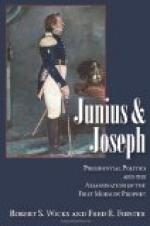As for him, his self-despite was pain that rendered him oblivious of her real danger. Where was his boasted justice? Gone before a breath of jealousy. The neighbours had told him that she had smiled on Halsey, and the abuse of the Smithites, in which his mother indulged in the blindness of religious party-spirit, had fallen from his lips as soon as his own passion had been touched. Had his former candour, then, been the thing his mother called it, indifference to, rather than reverence for truth?
This was the travail of soul that Susannah could have as little thought of as he had of hers. It held Ephraim in its fangs for many days.
CHAPTER V.
The return of Smith and his few followers, and the speedy publication of the first edition of the Book of Mormon, stirred anew the flames of religious excitement. All other sects were at one in decrying “the Mormons,” as they now began to be called by their enemies. There was perhaps good reason for intelligent disapprobation, but Understanding was left far behind the flying feet of Zeal, who, torch in hand, rushed from house to house. It was related that Joseph Smith was in the habit of wounding inoffensive sheep and leading them bleeding over the neighbouring hills under the pretext that treasure would be found beneath the spot where they would at last drop exhausted; and there were dark hints concerning benighted travellers who, staying all night at the Smiths’ cabin, had seen awful apparitions and been glad to fly from the place, leaving their property behind. There was a story of diabolical influence which Smith had exercised in order to gain the young wife whom he had stolen from her father’s roof, and, worse than all, there were descriptions of occult rites carried on in secret places, where the most bloody mysteries of the Mosaic priesthood were horribly travestied by Smith and his friends, Cowdery and Rigdon, in order to dupe the simple into belief in the new revelation.
Ephraim Croom had again withdrawn himself out of hearing of the controversy. Judging that Susannah was sufficiently guarded by his parents to be safe, he became almost oblivious of conversation which he despised. He did not reflect that Susannah knew nothing of his hidden conflict, that she could only perceive that, after uttering an ominous warning, he had left her to work out its application alone.
It was at first not at all her liking for the Smiths, but only her unbiassed common sense, which convinced her that the wild stories told concerning them were untrue. When she became enraged at their untruth she became more kindly disposed toward the young mother, whose baby had made a strong appeal to her girlish heart, and the big kindly lout of a man who had sheltered her from the rain. This benevolent disposition might have slumbered unfruitful but for the memory of the fine and resolute face of the young disciple




